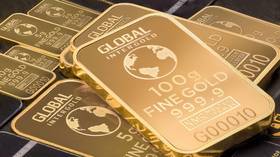Are Russia, China & Turkey bringing back the gold standard? RT’s Keiser Report finds out

Global central banks bought more bullion last year than at any time since 1971, when the US ended the gold standard.
Governments added 651.5 tons of gold to their coffers in 2018, according to the World Gold Council. It said that Russia, China and Turkey are leading the gold-buying spree.
That could mean the three countries are “re-imposing the gold standard just by the fact of accumulating it like this, by stocking gold,” says Stacy Herbert.
“They are forcing revision and re-introduction of the gold standard,” agrees Max Keiser, adding that all those three countries have to do is “introduce gold-backed currency.” Russia could introduce a gold-backed ruble, he suggests.
READ MORE: Russia leads global gold purchases to reduce reliance on US dollar
Stacy explains that “every time you send US dollars or euros or whatever currency you trade into them, and they have a trade surplus… they just use it to buy gold.”
Thus it’s a gold standard, she concludes, with Max adding: “Right, it is de-dollarization, de-globalization.”
For more stories on economy & finance visit RT's business section















